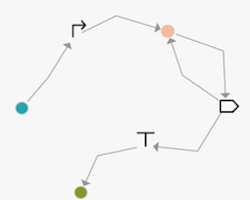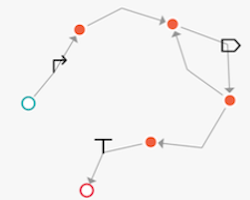Latest stable version available at ConstellationCAD
git clone [email protected]:hicsail/constellation-js.git
npm run build && npm run startThen open http://localhost:8082/ on browser
The package can be installed in the following way.
npm install constellation-jsIt is possible to generate a collection of designs that match a specification using graph construction and traversals.
const constellation = require('constellation-js');
let goldbar = '{PT7_a then galK}';
let categories = {
"PT7_a":{
"promoter": [
"PT7_WTa",
"PT7_3a",
"PT7_1a"
]
},
"galK":{
"cds": [
"galK"
]
}
}
let result = constellation.goldbar(goldbar, categories, {designName: 'my-first-design'});
// result.stateGraph, result.designs, result.sbol, result.messages| Optional parameters | Description |
|---|---|
designName |
Name of design space for SBOL output, defaults is "constellation-design" |
numDesigns |
Max number of designs to enumerate, default is 20 |
maxCycles |
Cycle depth for -orMore operators, default is 0 |
representation |
Choose between EDGE or NODE based graph, default is EDGE |
| Output | Description |
|---|---|
stateGraph |
See Graph Data Structure |
designs |
List of enumerated designs |
sbol |
See Synthetic Biology Open Language |
messages |
Errors or warnings, if applicable |
It is also possible to generate a collection of designs that match a specification using a purely symbolic approach (note that this approach supports only a tolerance of 0 for the AND operator and does not support the MERGE operator).
let result = constellation.symbolic(
"(one-or-more a) then (one-or-more x)",
{"a": {"b": ["c"]}, "x":{"y": ["z1", "z2", "z3"]}},
{"numDesigns": 'all', "maxCycles":7});GOLDBAR syntax for the case studies described in the manuscript are available here and can be demoed on Constellation's UI via the drop down menu.
Genetic design spaces in Constellation are represented in three ways:
- GOLDBAR
- Directed cyclic graph
- SBOL
The supported GOLDBAR concrete syntax for genetic design spaces is presented below using extended BNF notation. Notice that then and . are equivalent, and the delimiters (...) and {...} are equivalent.
<seq> ::= <exp> then <seq>
| <exp> . <seq>
| <exp>
<exp> ::= <term> or <exp>
| <term> and0 <exp>
| <term> and1 <exp>
| <term> and2 <exp>
| <term> merge <exp>
| <term>
<term> ::= one-or-more <term>
| zero-or-more <term>
| zero-or-one <term>
| reverse-comp <term>
| ( <seq> )
| { <seq> }
| <atom>
<atom> ::= ([A-Za-z0-9]|-|_)+
The JSON schema for the GOLDBAR abstract syntax tree representation (parsed from the concrete syntax presented above) can be found in schemas/ast.schema.json.
Constellation supports both NODE and EDGE based versions of a design space. Below are examples equivalent to the GOLDBAR specification promoter then one-or-more CDS then terminator
 |
 |
|---|---|
| Visualization of node-based graph | Visualization of edge-based graph |
The JSON schema for a design space graph can be found in schemas/graph.schema.json. Below is an example of a node-based graph within a single node in JSON format.
{
"604571a7-9e38-4647-afd0-9546399480b5": {
"id": "604571a7-9e38-4647-afd0-9546399480b5",
"text": "root",
"type": "root",
"edges": [
"b79407eb-95f0-4b78-99da-779f2c9cad46",
"7f6ca2fb-ef67-4687-924c-4285de896877"
],
"operator": ["One"]
}
}
SBOL is an open standard for the representation of in silico biological designs, and the icons used in this tool are provided by SBOL Visual. Design spaces are expressed in SBOL via the CombinatorialDerivation extension and can be exported and stored in Knox. This third form of design space representation allows Constellation to be easily integrated in the synthetic biology community.

